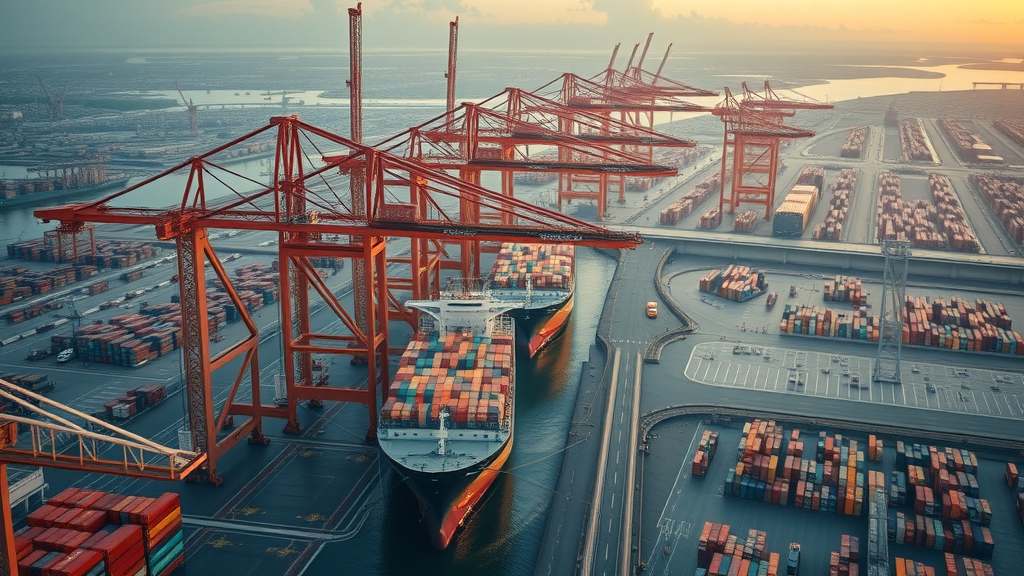How can significant reductions in cargo transit times impact trade efficiency across Africa? This article delves into the remarkable achievements made by TradeMark Africa, exploring the strategies implemented to streamline cargo movement and enhance economic integration within the region.
Overview of Cargo Transit Times
Understanding cargo transit times is crucial for businesses that rely on efficient supply chains. Cargo transit time refers to the duration it takes for goods to move from one location to another within the logistics framework. A variety of factors can influence these times, including infrastructure quality, border regulations, and logistical coordination among multiple stakeholders. In Africa, where trade is vital for economic growth, optimizing cargo transit times has far-reaching implications.

TradeMark Africa's Impact on Cargo Transit Times
Key Achievements in Reducing Transit Times
TradeMark Africa (TMA), founded in 2010, has successfully undertaken initiatives aimed at reducing cargo transit times significantly. The organization has reported a stunning 16.5% reduction in cargo transit times on the Northern Corridor from Mombasa to Bujumbura. This is complemented by an impressive average 70% decrease in crossing times at selected one stop border posts. These achievements not only enhance logistical efficiency but also foster stronger trade ties across the continent.

Regional Economic Integration Efforts
The success of TMA can largely be attributed to its focus on regional economic integration. By collaborating with various stakeholders, including governments and the private sector, TMA facilitates smoother trading conditions. The rebrand to encompass a continental initiative in West Africa reflects TMA’s commitment to extend its impact beyond East Africa. The establishment of a finance company—Trade Catalyst Africa—further illustrates the innovative approach TMA employs in improving trade infrastructure.

Expert Insights on Cargo Transit Times
“TradeMark Africa has significantly reduced cargo transit times, enhancing trade efficiency across the region,” says a representative from TradeMark Africa.

Challenges in Cargo Transit
Common Obstacles to Efficient Cargo Movement
Despite notable progress, challenges remain for efficient cargo movement. Common obstacles include inadequate infrastructure, complex customs regulations, and lack of coordination between transport sectors. For instance, congested highways and outdated port facilities can hinder the timely arrival of goods, leading to increased costs and delays. Addressing these challenges is paramount for fostering a more conducive trade environment.

Strategies to Overcome These Challenges
Innovative strategies to overcome these challenges include investing in infrastructure upgrades, utilizing technology for real-time tracking, and enhancing border efficiency through streamlined processes. TradeMark Africa’s initiatives focus on addressing these pain points directly, thereby improving cargo transit times significantly.
The Role of Technology in Reducing Transit Times
Innovative Solutions Implemented by TradeMark Africa
Technology plays a pivotal role in enhancing logistics performance. TradeMark Africa has introduced several innovative solutions, including digital systems for tracking cargo and facilitating communication among stakeholders. These technological advancements ensure better coordination, leading to reduced transit times and improved overall efficiency. For more insights on how technology is transforming productivity, you can explore how AI is revolutionizing note-taking.
Future Trends in Cargo Transit Technology
Looking ahead, advancements in artificial intelligence, automated logistics systems, and blockchain for transparent transactions promise to revolutionize cargo transit even further. As TradeMark Africa continues to lead the charge in adopting these technologies, it sets a precedent for future developments in the logistics landscape across Africa.

What You'll Learn
- The significance of cargo transit times in trade
- TradeMark Africa's achievements in improving these times
- Expert insights on overcoming challenges in cargo logistics
- The impact of technology on cargo transit efficiency
FAQs about Cargo Transit Times
How long does cargo ship transit take?
Typically, cargo ship transit times vary depending on route, distance, and shipping conditions, averaging from days to weeks.
How long does cargo take to arrive?
The time taken for cargo to arrive can depend on multiple factors, including shipping method and destination, but it's crucial for businesses to plan accordingly.
What is transit time in logistics?
Transit time in logistics refers to the total time taken for a shipment to be delivered from the sender to the recipient, encompassing all logistical processes.
How long are shipments in transit?
Shipments can be in transit for varying durations based on the mode of transport, customs clearance, and logistical complexities involved.
Key Takeaways
- TradeMark Africa has made significant strides in reducing cargo transit times.
- Technology plays a crucial role in enhancing logistics efficiency.
- Understanding challenges is key to improving cargo movement.
Conclusion
In summary, the efforts made by TradeMark Africa in reducing cargo transit times have set a benchmark for trade efficiency in the region. By addressing challenges and leveraging technology, TMA continues to pave the way for sustainable economic growth across Africa.

Discover Trade Mark Africa
For more information about TradeMark Africa, visit their official website at TradeMark Africa or call +254204235000.
 Add Row
Add Row  Add
Add 






 Add Row
Add Row  Add
Add 

Write A Comment